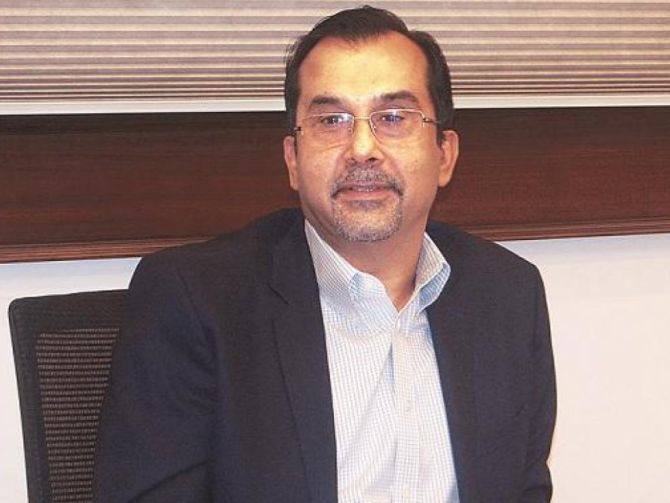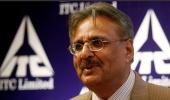To take the Rs 49,000 crore ITC to the top slot in the highly competitive FMCG business will require some aggression.

In 2011, just after getting another five-year term as chairman of ITC, Yogesh Chandra Deveshwar (excluding cigarettes) elaborated his broad vision for the tobacco-to-Fast Moving Consumer Goods (FMCG) company in a free-wheeling interview with Business Standard.
One, he wanted ITC to become the country’s largest FMCG company (excluding cigarettes) overtaking its key rivals like Hindustan Unilever and Nestle in the next 10 to 15 years.
Two, he envisioned that half of the group’s profits would come from non-tobacco business within the same time period.
Three, he was open to spinning off the FMCG business into a separate company maybe when it has revenues over Rs 15,000 crore.
A few years later, he added a fourth target: Revenues of Rs 1 trillion for the FMCG business by 2030.
These ambitious plans will now be the responsibility of Sanjiv Puri who last week was appointed chairman, a man whom Deveshwar, who died earlier this month, had handpicked for the job.
To say that achieving the targets his mentor set will be challenging would be an understatement.
To take the Rs 49,000 crore ITC to the top slot in the highly competitive FMCG business will require some aggression.
Hindustan Lever’s revenues continues to be over three times those of ITC’s FMCG (non-cigarette) revenues, and the gap is not really getting smaller.
In FY2019, the gap between ITC’s non-cigarette FMCG revenues and Hindustan Lever’s sales was over Rs 25,000 crore, compared with Rs 21,000 crore in FY2015.
Indeed, Deveshwar’s ambition to garner a larger share of profit from ITC’s non-tobacco business still looks a tall ask.
In FY19 tobacco accounted for around 80 per cent of ITC’s profit before tax (PBT), even though the bulk of the capital outlay was invested in the non-tobacco businesses.
FMCG’s contribution is a mere 1.7 per cent to PBT.
To be fair, Deveshwar had succeeded in garnering sufficient volumes from the FMCG business; it accounts for 25 per cent of company’s gross revenues from sales.
It also has been in the black for the past six years.
But Deveshwar’s revenue target for 2030 for FMCG simply means that this business has to grow over eightfold in the next 11 years to reach that magic number.
To offer an idea of the challenge: in FY2019, Deveshwar’s last full year as chairman, ITC’s non-cigarette FMCG revenues grew only 10 per cent.
Puri is well placed to understand the multiple challenges involved in ITC’s transformation, having worked through various divisions from tobacco to consumer goods.
Old ITC hands also say he’ll likely have an easier time organisationally.
Thanks to the management changes, which saw many senior and older executives leave or retire, Deveshwar has ensured that Puri has a free hand in running the show.
“That is very different from when Deveshwar was appointed as chairman, which saw the old guard and contenders challenge him and split the board.
"He has ensured that his successor does not have to face the same challenge,” says a former top executive of ITC who worked closely with Deveshwar.
But Puri’s challenge is no longer just to ensure that the share of non- tobacco revenues grows year on year.
He has to go to the next stage to ensure that the share of ITC’s profits from the non-tobacco business grows exponentially to meet Deveshwar’s target - from FMCG, hotels, paper boards, agri business amongst others.
The cornerstone of that strategy has to be the FMCG business where there is huge potential for volume expansion in new categories, deepening of distribution, as well as increasing the brand portfolio.
That is why Puri is pushing the FMCG business into dairy, coffee, frozen and fresh vegetables as well as chocolates.
But crowding the shop shelves is one thing; catching the consumer’s attention is another.
As an analyst pointed out, “In tobacco, ITC dominated the market and there was hardly any credible challenger.
"Those who came either failed to enter or closed operations (Japan Tobacco, Rothmans and so on) or made no dent due to regulatory and foreign direct investment restrictions and the ban on manufacturing.”
FMCG, however, is another ballgame.
ITC does not enjoy protection from competition here, and faces not just global giants but even domestic biggies like Patanjali and Dabur.
“Each segment of the FMCG market has entrenched players where ITC is just a new challenger - for instance, in juices it faces PepsiCo as well as Dabur,” an analyst who has tracked the FMCG space points out.
Still, concentrating on the non-tobacco business is imperative for ITC’s long-term survival: Cigarette sales are slowing, margins are being squeezed with the government increasing duties by over 200 per cent and the anti-tobacco lobby is pushing in for more restrictions.
That is yet another area that Puri has to handle: Managing the environment, whether it is with the government, which has relentlessly increased duties or when it periodically reviews FDI policy in tobacco.
He also has to engage with tobacco farmers in Andhra and Karnataka always looking for better price or take a stand against anti-tobacco lobbies, such as those that recently went to court challenging Life Insurance Corporation’s equity in tobacco companies.
It’s an area that Deveshwar and his small team handled effectively, with his frequent and long visits in Delhi and continuous engagement with key stakeholders as well as political networking.
Puri also has to manage a somewhat contentious relationship that the top management has historically had with its largest single shareholder, BAT, with 29.5 per cent equity.
In Deveshwar’s time, the UK tobacco giant had clashed with the Indian management over its plans to up its stake in the company.
This time round, BAT has endorsed Puri’s elevation and said it does not want to increase its shareholding.
But only last year it defeated a special resolution for the issuance of stock options to ITC employees saying it would dilute their shareholding.
And with on-again, off-again news that SUUTI (Specified Undertaking Of The Unit Trust Of India, an administrator for a rump government-owned mutual fund), which holds 7.96 stake in ITC wanting to sell it off, Puri has to keep a close watch on how existing shareholders respond to such a sale.
“Puri has to keep BAT at bay even while engaging with them and getting their support for entering non-tobacco areas,” an old ITC hand said.
In other words, he’ll have to walk the tightrope even as he focuses on turning Deveshwar’s grand plan into a reality.
Photograph: Courtesy, Business Standard












 © 2025
© 2025